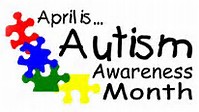
Getting to know Autism by Danielle North
31st March 2017We are about enter Autism Awareness Month. As such, we wanted to help spread the word to increase everyone’s knowledge and understanding. We will look at what Autism is. How it affects people. What support that can be offered to suit the unique and specialised needs of those with Autism.
Autism affects how people perceive the world; it affects how they interpret themselves, others, objects and the world around them. Autism affects how people interpret other’s feelings and intentions and how a person expresses themselves. Communication difficulties are common, including how they understand what is being communicated to them.
Let’s first address some of the common misunderstandings of autism. Whilst we would like to think everyone knows ‘Autism is a lifelong developmental disability that affects how people perceive the world and interact with others’. This is in fact, not common knowledge
- We have heard Autism being described as a learning disability, a mental health issue or even a brain injury, when in fact is none of them.
- Some theorists have even placed blame on parents for how they have bought up their child suggesting that Autism is a direct result of parenting style. One particular theory known as the ‘Refrigerator mother theory’ specifically puts the blame on the mother, for being ‘cold’ towards the child and not providing them with the emotional warmth they need.
- People with Autism are limited and will never develop. This is simply not the case. By supporting people with Autism in the right way and with the right people we can often see people flourish. Whilst there is no cure for Autism, we understand that by making the world around our clients more manageable, they can learn to better cope with some aspects the world around them.
Now let’s look at some of the facts of Autism, did you know?
- Autism affects around 700,000 people in the UK. If you think about the impact on family members this number increases to around 2.8 million people.
- Records show males are five times more likely to be diagnosed. Research studies have found a difference between genders, however more recently Autism has been found to be under-diagnosed in females.
- There is no cure. It is not an illness or disease; it is for life and a huge aspect of and autistics person’s identity.
- Being Autistic does not mean you have a learning disability – between 48 and 56% of Autistic people do not have a learning disability.
- Around one in three Adults with Autism are experiencing severe Mental Health Difficulties which is due to a lack of support being offered.
- Leo Kanner first described a specific pattern of behaviour as ‘Early infantile Autism’ in 1943.
- Only 16% of Adults with Autism in the UK are in full-time paid employment and only 10% of Autistic adults receive the employment support they need which a huge 53% saying they want it.
- Autism does run in families. Many studies have identified families often have multiple members with a diagnosis of Autism, if not all siblings.
- People with Autism do have feelings.
(Facts sourced from NAS website)
Our Care Coordinator, Danielle North, has shared her experiences of working with clients who have Autism:
One of my first experiences working with individuals with Autism was supporting a client to write out their Christmas cards. I innocently suggested that they ‘lick the envelope’ to observe them to lick the front of the envelope. Little did I know that some individuals with Autism will take a literal meaning from anything you say. From this point onwards I found Autism to be fascinating.
Since working in the healthcare sector I have come across some inspiring individuals who show a real passion in topics of interest. One individual could do a 1000 piece jigsaw without looking at the picture and another could tell you anything and everything about war aircraft.
Literature would suggest that some significant historical and intellectual figures have been suspected to have Autism. This includes Albert Einstein, Mozart, Isaac Newton and Charles Darwin.
As a growing nation we need to embrace and encourage these individuals to grow by providing them with the support they need and I have no doubt we will learn a lot from them in exchange.
Here at VP, we support clients with a range of complex needs. We support them to be who they want to be, accepting them for who they are and enable them to learn and maintain skills they require to live as independently as possible.
If you know anyone who requires support and would like to talk to someone who understands. Please give one of our friendly team members a call on 0870 850 4265
back to all news